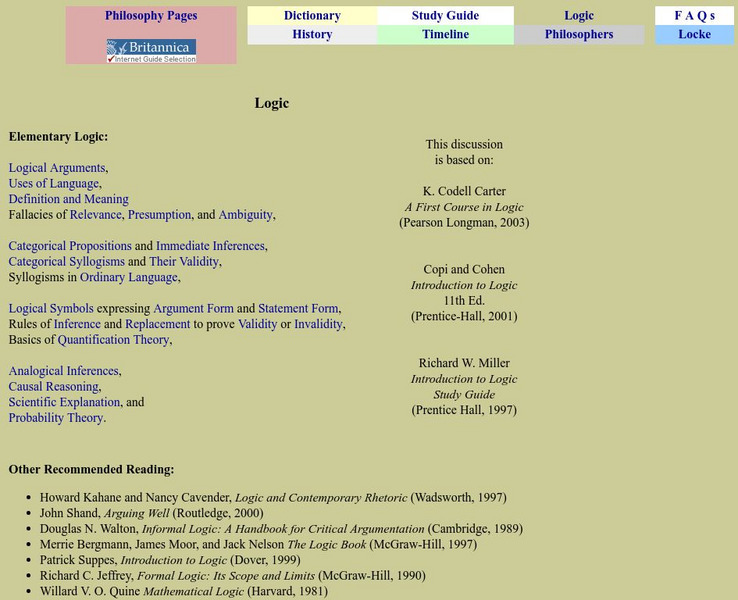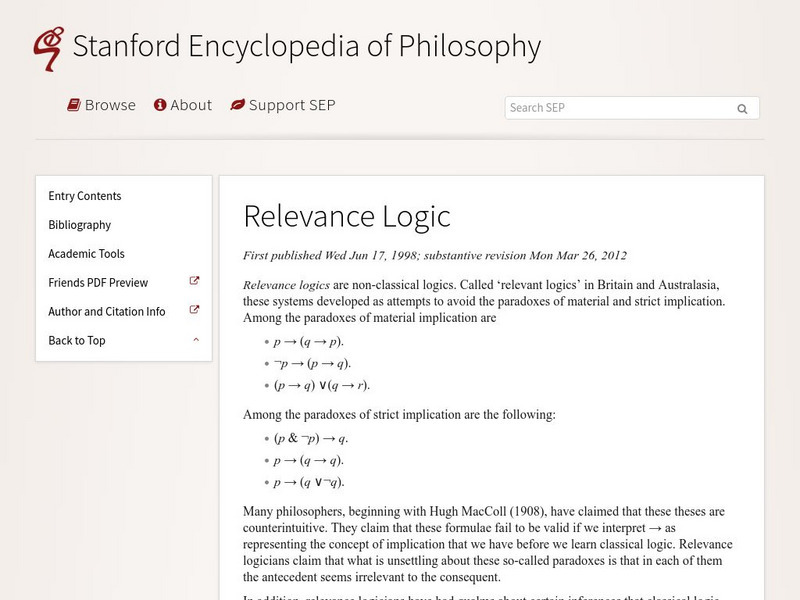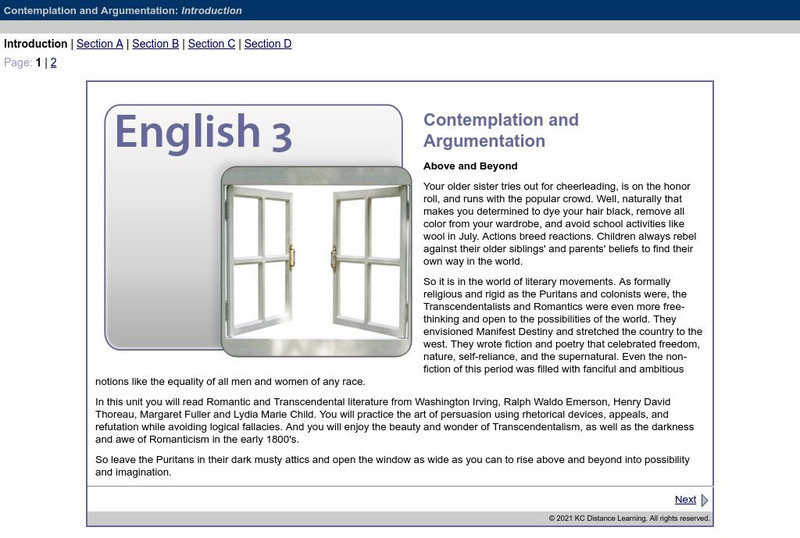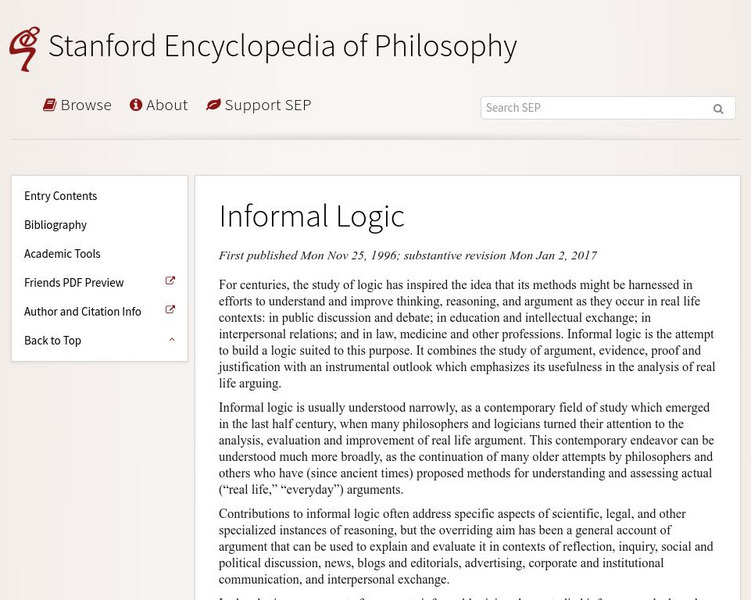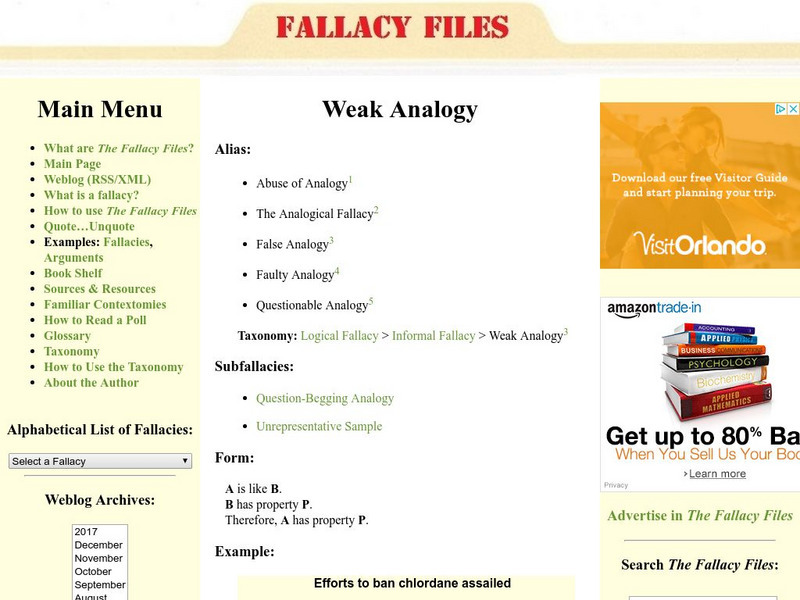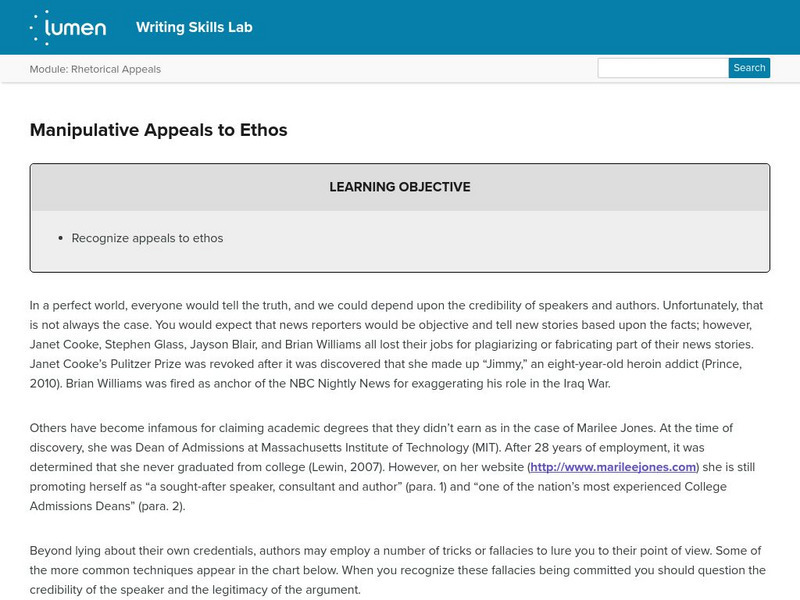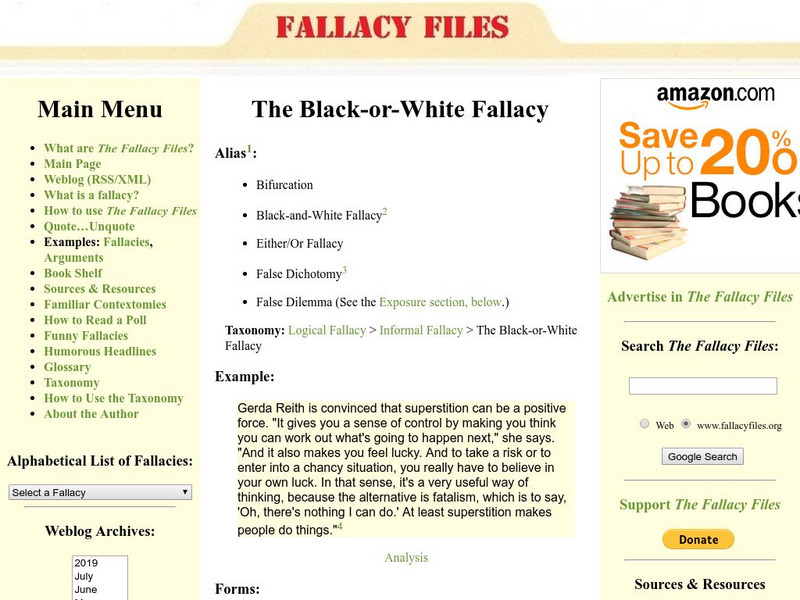Philosophy Pages
Philosophy Pages: Logic
This site can get as detailed as you care to get in the study of logic. Start at the beginning for a definition of logic, and continue on for more in depth study.
Stanford University
Relevance Logic/stanford Encyclopedia of Philosophy
Discusses the topic of relevance (or relevant) logics. Presents the theory and applications of relevance logic, which attempts to resolve "fallacies of relevance."
Department of Defense
Do Dea: Contemplation and Argumentation
In this self-guided unit, you will read Romantic and Transcendental literature and you will practice the art of persuasion using rhetorical devices, appeals, and refutation while avoiding logical fallacies. By the end of the unit, you...
Sophia Learning
Sophia: Argumentative Essays
This tutorial focuses on argumentative essays, longer writings on a well-researched topic with the writer arguing one side of the topic, free of fallacies, and providing several claims. A short YouTube clip of Monty Python shows the...
Sophia Learning
Sophia: Critical Reading as a Learning Strategy
This tutorial focuses on critical reading using a downloadable PowerPoint presentation, "Critical Reading 101," which includes separating fact from opinion, 6 propaganda techniques, and 6 common fallacies in reasoning. Also provided is...
Other
Pressbooks: Let's Get Writing: Chapter 3: Argument
This chapter focuses on writing an argument including what is an argument, types of arguments, elements of arguments, layouts, claims, counterarguments, evidence, validity, types of fallacies, and more. W.9-10.1 Arguments, W.11-12. 1...
Khan Academy
Khan Academy: Denying the Antecedent and Affirming the Consequent
Test your knowledge of the fallacies of denying the antecedent and affirming the consequent.
Lumen Learning
Lumen: Boundless Communications: Logical Appeals
This activity focuses on using logical appeals in persuasive speeches including inductive and deductive reasoning, inductive reasoning and associative reasoning, forming a rational appeal, and errors in reasoning-formal and informal.
Stanford University
Informal Logic/stanford Encyclopedia of Philosophy
Describes the recent movement known as "informal logic." Summarizes its brief history, provides several detailed examples, and explains its relationship to philosophy. Bibliography included.
ClassFlow
Class Flow: Becoming an Effective Listener
[Free Registration/Login Required] This flipchart focuses on the traits of an effective listener and the identification of popular logical fallacies and propaganda techniques. In addition, there is an Activote at the end to check student...
Other
Weak Analogy
Provides alternate names for the concept, a definition, examples, and explanation of the examples. The author is a former college professor, so the information can be trusted.
Other
Wsu: Improving Your Argument
Students writing persuasive essays run the risk of using inaccurate or illogical reasoning. This site by Weber State University provides pointers to help eliminate this problem. Several dos's and don'ts are given, as are 14 common...
Lumen Learning
Lumen: Rhetorical Appeals: Manipulative Appeals to Ethos
This lesson focuses on the ways appeals to ethos can be manipulative including lying about their credentials and employing a number of tricks or fallacies to lure you to their point of view.
Grammarly
Grammarly Handbook: Methods of Reasoning
A list (with examples) of common errors in logic including the following: non sequiturs, hasty generalization circular argument, ad hominem, ad populum, and red herring.
Other
Fallacy Files: Loaded Question
Good explanation of the logical fallacy known as the loaded question (also known as complex question, many questions, or plurium interrogationum). An example, explanation of the example, and links to additional resources are all provided...
Other
Fallacy Files: Black or White Fallacy
Discusses the error in logic behind the Black-or-White Fallacy (Either/Or Fallacy). Although a great deal of information about the fallacy is given, it is written at a fairly high reading level. Older students would definitely get more...
Other
Fallacy Files: Begging the Question
Discusses the error in logic behind the fallacy of Begging the Question (also known as Circular Argument, Circular Reasoning, Circulus in Probando, Petitio Principii, or Vicious Circle). Although a great deal of information about the...
Other
Fallacy Files: Bandwagon Fallacy
Clear explanation of the flaw in logic known as Bandwagon Fallacy (also known as Appeal to Popularity, Bandwagon Appeal, Argument by Consensus, Argumentum ad Populum, or Authority of the Many). Along with a definition, example, and...
Khan Academy
Khan Academy: Division and Composition
Test your knowledge of the distinction between the fallacy of division and the fallacy of composition.
Khan Academy
Khan Academy: Begging the Question
Test your knowledge of the fallacy of begging the question.
Khan Academy
Khan Academy: Post Hoc Ergo Propter Hoc
Test your knowledge of the post hoc ergo propter hoc fallacy.
Other
Propaganda Critic
A comprehensive site that offers student information on: Name Calling, Glittering Generalities, False Connections, Bad Logic or Propaganda, Wartime Propaganda and more! Site also offers the Propaganda Gallery - short video clips that can...
Other
European Society for General Semantics: False Dilemma
An explanation of the logical fallacy called False Dilemma (also known as Manicheanism, Black-and-White Thinking, Black-or-White Fallacy, Bifurcation, Bogus Dilemma, or Either/Or fallacy). A definition, explanation, and a number of...
Other popular searches
- Identifying Fallacies
- Powerpoint Logical Fallacies
- Rhetorical Fallacies
- Fallacies of Logic
- Logical Fallacies Word
- Logical Fallacies Cross
- Identifying Faulty Logic
- Food Fallacies
- Perceptual Fallacies
- Identifying Health Fallacies
- Fads and Fallacies
- Logical Fallacies for Kids


